The English Bulldog is calm, confident and loving. Their coat is low maintenance and comes in a lot of gorgeous colors and patterns. With a distinctive thick set body and wide head, their iconic look has earned them a lot of fans.
But unfortunately, this cute face and body comes a host of health problems and a very short lifespan of around 6 years.
What’s in this Guide to the Bulldog:
- English Bulldog At A Glance
- In-depth Breed Review
- English Bulldog Training And Care
- Pros And Cons Of Getting A English Bulldog
English Bulldog FAQs
Our readers’ most popular and frequently asked questions about the Bulldog.
- Are English Bulldogs good pets?
- Why are Bulldogs so expensive?
- Are Bulldogs aggressive?
- Are English Bulldogs smart?
Keen to learn more, here are the vital statistics!
Breed At A Glance
- Purpose: Originally bull baiting, now a companion
- Weight: 40 – 50 lbs
- Temperament: Calm, confident, friendly
- Lifespan: 6 – 8 years
Those are the quick facts, now let’s dive into the details.
English Bulldog Breed Review: Contents
- History and original purpose of the English Bulldog
- Fun facts about English Bulldog
- Bulldog appearance
- English Bulldog temperament
- Training and exercising your Bulldog
- English Bulldog health and care
- Do Bulldogs make good family pets
- Rescuing an English Bulldog
- Finding a Bulldog puppy
- Raising an English Bulldog puppy
- Popular Bulldog mixes
- Products and accessories
The Bulldog we know and love these days is a far cry from their ancestors.
Let’s take a look at how they’ve changed over time.
History and original purpose of the English Bulldog
As their name suggests, the Bulldog was originally bred for the sport of bull-baiting.
This was an activity where dogs were set upon a tethered bull, and bets laid on their survival.
As a result, these were physically very fit, strong, and probably quite ferocious dogs to cope with this horrendous ‘game’.
You can see a painting of a Bulldog from 1790 here.
He doesn’t look a great deal like the modern Bulldog of today.
Bull baiting become illegal in 1835, and the breed was kept alive by some enthusiasts, who began selectively breeding the ancestors of our modern dogs.
And there were some changes to the original design of the dog.
Some claim that the original Bulldogs were crossed with Pugs, which explains the receding muzzle and their small size.
Others dispute that this happened or was even possible.
Whatever the process involved, today’s English Bulldog is a very different dog indeed to the fighting machine we see in old paintings.
Show Bulldogs emerged
The breed has continued to change in appearance over the last fifty years or so.
The image below shows the changes that have taken place in the skull.
These changes have arisen as a result of selective breeding.
Along with a changing interpretation of the breed standard in the show ring.
Basically, the more time passes the more their features have been exaggerated.
Bulldog breeders have come into a lot of criticism in the last few years.
The public has become more aware of the potentially harmful effects their structure has on their health.
Although some breeders are now trying to bring back a more moderate shape, there is a long way to go.
English Bulldog appearance
This is an iconic dog, with a very characteristic look.
The modern day Bulldog is heavy-set, with a broad skull.
His eyes sit low in his face and his muzzle is short with a tipped back nose.
The lips hang low around his mouth.
His jaw is undershot, causing his bottom teeth to protrude over the upper teeth.
And his body is broad, deep and has stocky limbs.
His tail is curled.
Bulldog size
These are medium sized dogs in terms of their height. However they are by no means small.
An adult Bulldog can weigh around 50 lbs or more.
Average weight for a female should be around 40lbs, with males weighing closer to 50lbs.
Being overweight is very bad for your dog, and you should keep your Bulldog slim with a tucked in tummy.
Bulldog colors
Bulldogs come in a range of colors, but are likely to be one of the following:
- Fallow
- Fawn
- Brindle
- White
- Red
Or a combination of two or three of the above.
They can also have a wide variety of markings.
Having a black mask or tips. Being brindle, piebald or ticked across their body.
They can also have white markings in places.
English Bulldog temperament
A far cry from their fighting routes, Bulldog temperament is known to be calm, courageous and friendly.
They are confident dogs, who are loyal and affectionate to their families.
Although they have been bred as fighting dogs in the past, modern Bulldogs are not generally aggressive towards humans.
They are friendly and loving in nature.
A pet Bulldog will be a playful, active puppy to have in the house.
This charming puppy will then in all likelihood grow into a calm, friendly older companion.
Training and exercising your English Bulldog
This breed responds best to positive reinforcement training techniques. They are strong willed dogs.
As a result it is easier to motivate them using rewards than to resort to aversives.
These intelligent dogs love to learn. And as Bulldogs can not cope with much physical exercise, keeping their mind busy and engaged is especially important.
Socialization
Socialisation to a range of people, animals and locations will help your dog to carry that innate confidence on into adulthood.
Make sure that your puppy has positive experiences around other dogs and becomes familiar with any other types of pet he might meet.
Due to their fighting dog heritage, some Bulldogs can still be wary of other dogs.
Getting them to meet lots of dogs when they are still in the period of socialization will help to reduce the likelihood of this becoming a problem for your puppy later on.
Bulldog exercise
Some individuals are more active than others.
Although they would all love to have a good walk or play each day, many are not physically capable of coping with anything above a very low level of exercise.
It all depends on the severity of their respiratory problems.
But if you want a dog to take jogging, hiking or out in the hot weather, a Bulldog is not a good choice for you.
This is a breed that does best in cool climates and it is really important that you don’t exercise a your dog in hot weather.
Or let him lie out in direct sunshine on a warm day.
Splashing around in water may help to keep them cool, but bear in mind that many Bulldogs cannot swim at all, due to their conformation.
English Bulldog health and care
As you’ve probably sadly realized by now, Bulldog health is really very poor.
The Bulldog’s unusual appearance is due to its profoundly shortened muzzle and undershot mouth.
The body is also stocky, with wide spaced legs and is often furnished with a tiny corkscrew tail.
All of these breed characteristics unfortunately go hand in hand with some very serious health issues.
Brachycephaly
These are profoundly brachycephalic dogs.
Brachycephaly means that the facial bones have been radically shortened, relative to the proportions of the dog.
Humans like the appearance of brachycephalic dogs, probably because it makes the dog look more like us. More human.
We find that kind of cute.
But it comes at a heavy price for the dog.
Breathing problems, dental problems, eye problems, all these derive from the shape of the bulldog’s head.
But that is just the beginning.
Bulldogs also suffer from back problems, hip problems, whelping problems and more.
All as a result of their body structure.
On top of all that, like most other breeds, there are a range of inherited disorders to consider.
Let’s start by looking at the dog’s breathing.
Face shape
The key issue with this particular dog’s face is that we humans have created a dog with a very shortened skull.
But that all the other ‘tissue’ is still much the same as it would be for a dog with normal facial bones.
So, essentially we have a dog with the facial tissue necessary to cover and line a normal dog’s muzzle, but with nowhere to put it.
Inside or out.
And that causes a lot of trouble for the dog.
Bulldog breathing problems
The soft palate inside the Bulldog’s mouth may not fit the space available, leaving it to project into the dog’s airway at the back, partially blocking it.
Their nostrils may be closed rather than open (stenotic), and the airway itself may be too small. Sleep apnea in the breed is very common.
This results in a dog that has a compromised ability to breathe. So much so in some cases, that he may need major surgery to enable him to breath freely.
Not only does the shortened face lead to breathing problems, the flat-faced dog is also unable to cool himself effectively.
This is because dogs lose heat through panting.
And the efficiency of this heat loss is dependent on the area of moist tissue that extends along the length of the normal canine muzzle.
Bulldog cooling problems
A dog’s cooling process is comprised when their muzzle is too short.
It’s a bit like you taking a normal radiator out of your living room and replacing it with a much smaller one.
A dog’s muzzle is his radiator.
So a flat-faced dog loses less heat too than he should, and as a result his body overheats as soon as he starts to exercise or as soon as the weather warms up.
The Bulldog breed council have important information on this page about keeping your dog cool in hot weather.
Dental disasters
Brachycephalic dogs have just as many teeth as other dogs. But less space to put them in.
Consequently they suffer from overcrowding and have a greater potential for decay.
If you have a Bulldog puppy, you need to clean his teeth for him, and get them checked regularly by your vet.
Eye problems
The English Bulldog’s facial bones are not long enough to stretch out the skin on his face, so the skin falls into deep folds either side of his nose.
These folds can rub on the surface of the dog’s eyes and make them sore.
The folds are also prone to collecting dirt and becoming infected.
There is more eye trouble ahead for the Bulldog puppy though.
Because his flattened skull results in shallow eye sockets.
It is relatively easy to scratch or damage his eyes as they protrude from his head.
Cherry eye is very common in this breed.
Bulldog screw tails
As a result of their breeding, Bulldogs are prone to spinal problems caused by deformities in their vertebrae.
You can read about this in some detail in this article: Screw tails and hemivertebrae
Serious and painful back problems may arise in screw tailed puppies.
As a result the tails themselves can become ingrown, or inverted.
The skin folds around the tail, and under the tail itself need special care and cleaning.
Bulldog mating and whelping problems
The body shape of this breed can prevent them from naturally mating. Therefore insemination often has to be used instead.
Whelping is equally difficult, and most bulldog puppies these days are born by caesarian section.
It is so commonly required in this breed, that it isn’t even covered by insurance policies.
This is reflected in the price of puppies available for sale.
Bladder stones
Bulldogs are prone to painful bladder stones, but there is now a DNA test available to try and screen all breeding stock for this unpleasant disease.
If you are buying a bulldog puppy, you need to make sure that the parents have been screened under the scheme for this disease – called hyperuricosuria or HUU.
How long do English Bulldogs live?
Although the lifespan of the Bulldog is widely reported as being up to 10 years, this is sadly not the case.
A Kennel Club health survey from that looked at 180 Bulldog deaths, found that the average lifespan of the breed was just over six years.
Other studies have found them falling between 6 and 8 years.
This is a very short lifespan for a dog.
Most of us tend to hope that our dogs will be around for ten years or more, at least.
As we have seen in this article, part of the problem for these dogs is that their conformation is badly designed. The other is down to genetic diseases.
Bulldogs problems are both externally visible and hidden inside. A very sad combination, leading to a very short lifespan.
Care
Caring for this breed of dog can be a time consuming task because they are prone to dental problems and skin infections.
You will therefore need to check your dog’s mouth daily.
Look for any signs of tooth decay or unpleasant smells that could indicate gum or tooth problems.
Their skin folds are prone to infection too, and need to be kept scrupulously clean and dry.
You will need to make a regular visual inspection of your dog’s facial folds, neck folds and the folds around his tail base.
Wipe away any dirt or debris with damp cotton wool.
If your dog has a screwed tail you will need to clean this area carefully every single day.
Ensuring that it is dirt free and kept dry, to reduce the chances of nasty skin infections developing here.
Grooming
English Bulldogs have short low maintenance coats, which require a brief brush once a week at most.
Their fur is short, straight and smooth.
With no curling or feathering to it, it is easily managed with a normal dog brush.
Do English Bulldogs make good family pets?
This is a breed that tends to get along well with the children they live with, and that enjoys being petted and played with.
They are almost all very affectionate with their families, including the smaller members.
However, as with any dog supervision around young children is vital.
This enables you to protect them both from accidentally hurting each other.
They also benefit from early socialisation, to give them the best chance of feeling happy and confident around people of any age.
However, they don’t make good family pets when you take into account their severe health problems.
The heart ache, and expensive treatment, is enough to put many potential puppy parents off.
However, there is another option.
Rescuing an English Bulldog
At present there is no way that I can in good conscience recommend that you buy a Bulldog puppy.
These dogs have lovely personalities. But the price your puppy has to pay for his cute nature and iconic looks is very high.
These dogs are so structurally unsound that their quality of life is very poor, not to mention very short.
But that doesn’t mean a Bulldog is out of your reach, because there are some loving, loyal dogs waiting for homes.
Rescuing an English Bulldog means you know the extent of their health problems too.
English Bulldog puppies
English Bulldog puppies are incredibly cute.
They have wonderful personalities and appearances that may people find adorable. However, the breed in general is very unhealthy.
Even the best pedigree English Bulldog breeders will find it almost impossible to produce a puppy that will live a long and happy life.
English Bulldog price
The price for one of these puppies might shock you a little.
Puppy cost is high for a number of reasons. The main ones are popularity and the difficulty of breeding these dogs.
As we have seen, Bulldogs can rarely give birth naturally.
The breeder will have incurred a huge c-section cost before the puppies have even arrived.
You can expect to pay between $1,000 – $3,000 for a puppy in the US.
In the UK the cost will be somewhere in the region of £2,000 – £4,000.
Popular Bulldog mixes
Many people are concerned about the disabilities that we have bred into these dogs.
Fortunately, there are a number of breeders trying to create healthier alternative Breeds.
One notable example is the Leavitt Bulldog.
This is an attempt to recreate the type of dog seen in our old painting above, but with a better temperament that more reflects the modern dog’s nature.
You can find out more about these dogs here
Levitt Bulldog or Victorian Bulldog breeds are a better options.
And there are some first generation mixes that are proving quite popular too.
Comparing the English Bulldog with other breeds
The English Bulldog is a fairly unique breed in terms of looks. One that it is often compared with is the adorable little French Bulldog.
But how do they stack up against similar personalities?
Similar breeds
Sadly, the severe health problems associated with this breed are off putting.
But there are some other lovely breeds which have some similar traits to the Bulldog, but are healthier in general.
Still undecided? Let’s break it down to pros and cons!
Pros And Cons of Getting A English Bulldog
The English Bulldog has a wonderful personality.
But sadly there are more things to take into account when choosing whether to bring one home.
Cons
- Breathing problems
- Skin problems
- Eye problems
- Short lifespan
Pros
- Friendly
- Loyal
- Loving
Bulldogs need special care, and the right products can help with that.
Products and accessories
Here are some things you’ll want to stock up on:
- Best Shampoo for Bulldogs
- English Bulldog Food
- Best Toys for Bulldogs
- English Bulldog Puppy Food
The best way to bring home a Bulldog is probably from a rescue center.
English Bulldog breed rescues
Rescuing is a great way to bring an English Bulldog into your family.
Here are some rescues you might want to check out.
USA
- Bulldog Rescue Club of America
- Long Island Bulldog Rescue
- Georgia English Bulldog Rescue
- Illinois English Bulldog Rescue
- Buckeye Bulldog Rescue
- Lone Star Bulldog Rescue
Canada
UK
References and Resources
- Gough A, Thomas A, O’Neill D. 2018 Breed Predispositions to Disease In Dogs and Cats. Wiley Blackwell
- O’Neill et al. 2013. Longevity and Mortality of Dogs Owned In England. The Veterinary Journal
- Schalamon et al. 2006. Analysis of Dog Bites In Children Who Are Younger Than 17 Years. Pediatrics
- Duffy D et al. Breed differences in canine aggression. Applied Animal Behavior Science 2008
- Strain G. Deafness prevalence and pigmentation and gender associations in dog breeds at risk. The Veterinary Journal 2004
- Packer et al. 2015. Impact of Facial Conformation On Canine Health. PlosOne
- The Bulldog Breed Council
- The Leavitt Bulldog Association
- Can the Bulldog be saved?
- The Bulldog Rescue and Rehoming Trust
- O’Neill et al. 2013. Longevity and mortality of owned dogs in England. The Veterinary Journal.
- Adams et al. 2010. Methods and mortality results of a health survey of purebred dogs in the UK. JSAP.
- Ryan et al. 2017. Prevalence of thoracic vertebral malformations in French bulldogs, Pugs and English bulldogs with and without associated neurological deficits. The Veterinary Journal.
- Mazzucchelli et al. Retrospective study of 155 cases of prolapse of the nictitating membrane gland in dogs. Vet Record.
- Hendricks 1992. Brachycephalic Airway Syndrome. Veterinary Clinics of North America: Small Animal Practice.
- Torrez and Hunt. 2006. Results of surgical correction of abnormalities associated with brachycephalic airway obstruction syndrome in dogs in Australia. JSAP.
- Evans and Adams. Proportion of litters of purebred dogs born by caesarean section. JSAP.
- Riecks et al. 2007. Surgical correction of brachycephalic syndrome in dogs: 62 cases (1991 – 2004). JAVMA.
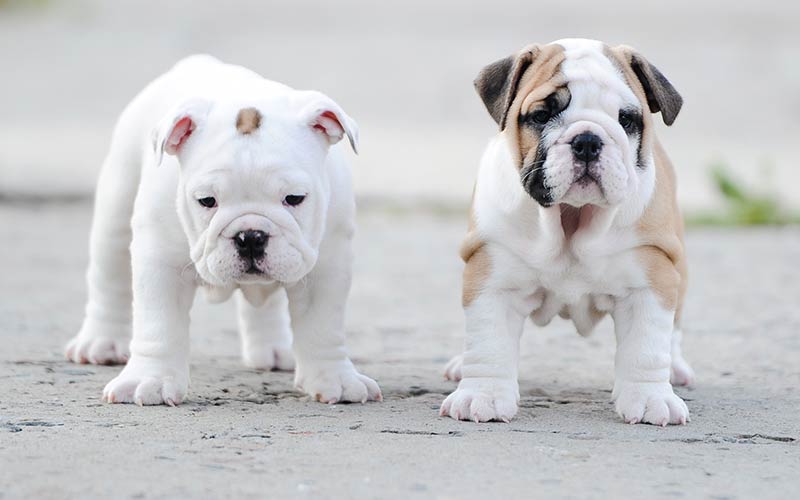
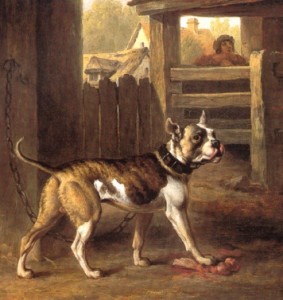

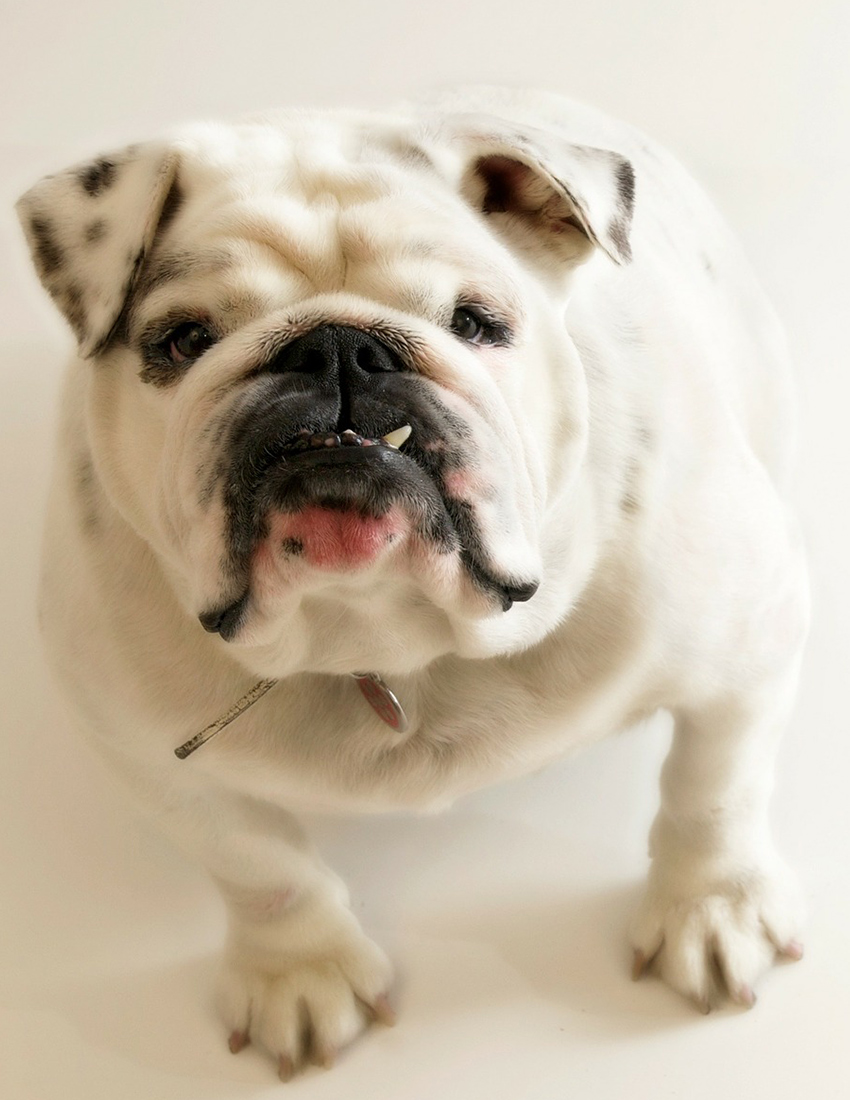


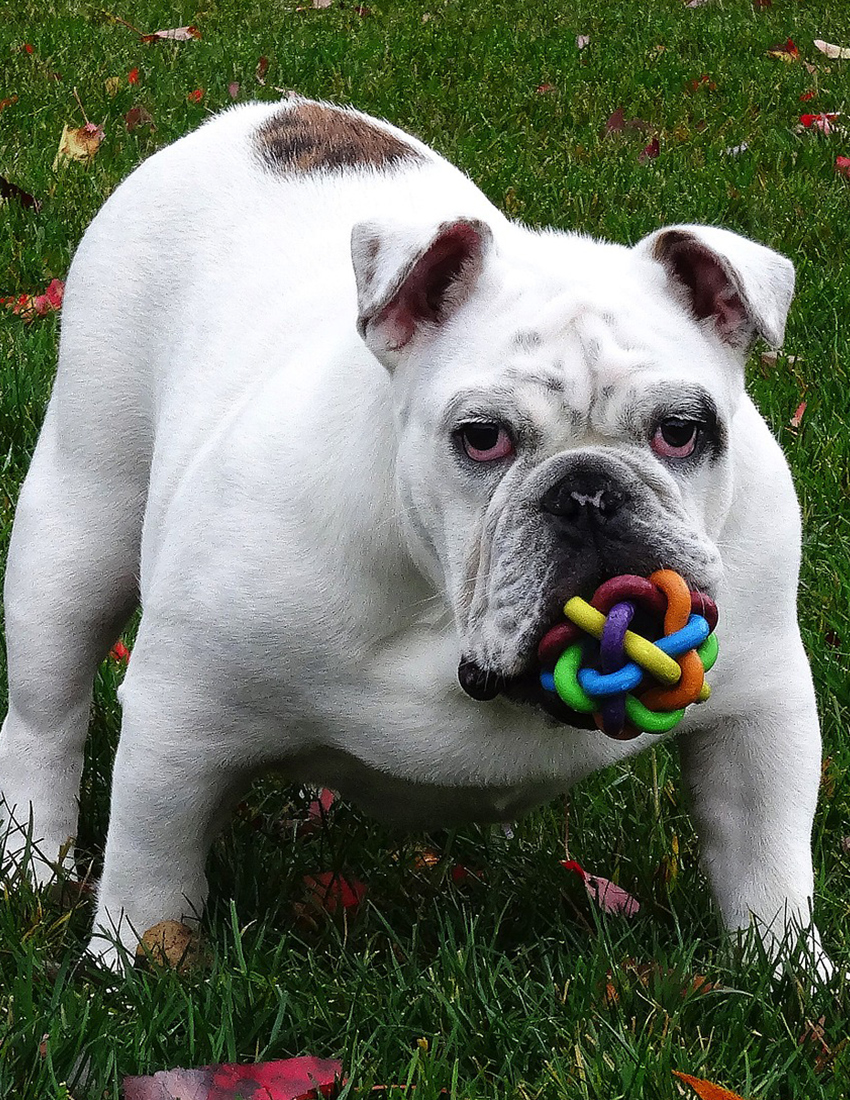




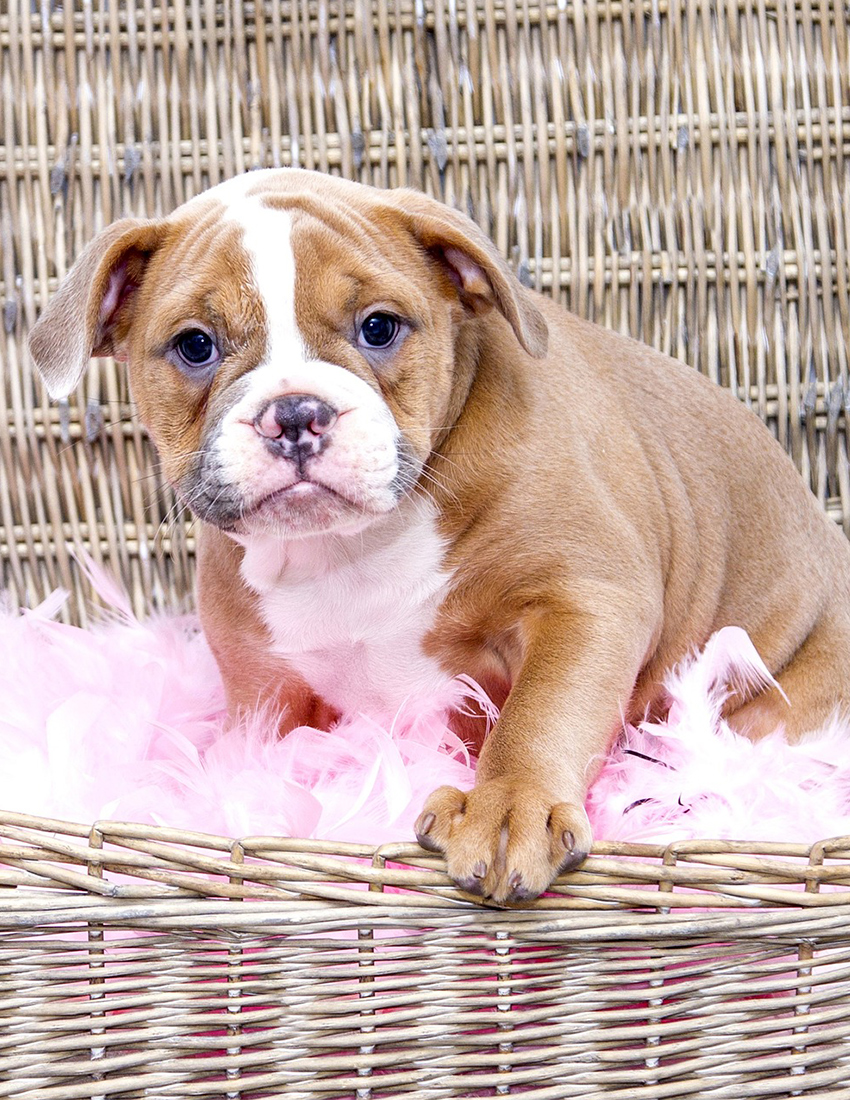

Nancy says
My little girl English bulldog passed away two days ago from cancer. She was 11 I have her older brother who is going to be 14 tomorrow and these dogs are like people I am so heartbroken and my dog knows she’s gone and even though they used to fight. He loved her so much too. What was the oldest Bulldog because I believe I have it he will be 14 tomorrow and he lost his back leg to bone cancer when he was five years old so it’s a testament to how well I have taken care of them because I love them so much.
Julie Krauss says
Wow-what a beautiful post. Highlights fascinating facts about bulldogs. The English Bulldog is calm, confident, and loving. Your dog will look more beautiful if you wear a beautiful collar. Dogs of this breed are so enchanting that you will want to caress them as soon as you see them. Your post will benefit dog lovers.
Cindy says
The breeder is everything in determining the health of the English Bulldog. I just lost my 2 girls, both age 11.5 years. They were healthy throughout their life and I didn’t spend any more money at the vet on them than I did on my Labs and Springer Spaniels. If anything, I spent less. I also kept them on a strict dogfood diet with the exception of no salt green beans, bananas, apples, and carrots. I made sure they weren’t overweight. They are very loving dogs and make great companions for the entire family.
Neal Culver says
My wife and I totally agree with you. Our Bulldog, Bebe, came from an excellent breeder and lived to a couple of months short of her 12th birthday. We kept her weight down, gave her a good diet and she lived a long and I believe a happy life. But, Bulldogs are not a low maintenance dog. You have to keep wrinkles and ears clean and be willing to take them to a Vet promptly when a problem develops, which is really true of all breeds.
Will says
I think your article was a very honest appraisal about the Bulldog. Well done!
They are fantastic dogs, but almost all of them are living under daily respiratory and other stresses due to their current conformation, which is not Fit for Purpose.
The other sad thing is that they have a high tolerance to pain, so owners are often not aware of the distress that their Bulldog is suffering.
What have we done to these beautiful, courageous dogs?
Sheron Sheffield says
My bulldog has bad skin allergies. What can we do to help
Wayne and Rhonda says
I agree that the pros far outweigh the cons. Yes, their health issues are expensive. I like to call Englush bulldogs “The millionaire’s dog”.
I’ve owned many dogs over my lifetime. But at 59, I got my first English bulldog and I have never been more patient in my life. This dog just gets me. And I get her. I am criticized for not setting boundaries and I spoil my dog. Guilty as charged.
An english bulldog will return the love you give it a thousand times. These dogs are utterly amazing and my only regret is that I didn’t discover this 30 years ago.
Wayne says
Thanks.
Dennis and sussn says
William will live in my mind fore we,he was so kind and happy to all that knew him..yf
Kristie Townsend says
❤️ I love my English Bulldog, Emily. She is a very good friend and companion 💯🐩🐕🐾❤️
Wilfredo Gordon says
Hi I bought one, but you need to find a responsible breeder. Mine is healthy, even though I have spent some money in vets visit. You also need a veterinarian who understand the breed.
Roxy and Rebal forever says
HELP! We lost my little boy English bulldog. My little girl just doesn’t seem to be handling it very well at all. She seems so sad all the time. She doesn’t like to go into the kennel they shared. She seems to look for him all the time. I have no idea how to help her at all. Hoping someone can give me some advise
Tammy says
As with any dog it’s all in how you take care of them and feed them…
Angela Jackson says
My bulldog chester was 11yrs 4 momths when he pass in may 2018 and he did have many health issue but once you have one life is never the same only in a good way so we just got another don’t be afaird to get one just get a good vet and and expect to have a smile on your face every time you look at them
Keith R Jackson says
Well I can tell you my English Bulldog passed away on 9/17/18 be there for 11 years his name is Roscoe
Joy Butler says
Hi Lucy, it’s so awesome that I stumbled upon your post because my mom told me that she wants to buy an English bulldog puppy. Since I have no idea about these puppies yet, I did search for it. She needs to know that these cute little English bulldog puppies’ lifespan is only more than 6 years. Thanks a lot!